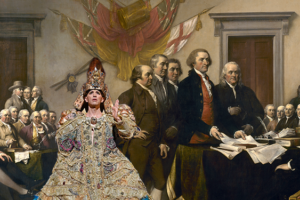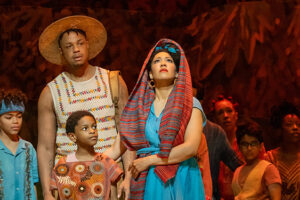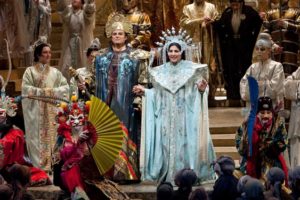

Here was a fine specimen of idol-singer for the ages: a hot, debonair lirico-spinto with baby boomer appeal and a propensity to draw panties onstage as well as flowers. The ladies love him. The bros respect him. The gays vie for appointments with their analysts. Daddy’s home!
But would he show? After all, part of La Kaufmann’s mystique lies in the fact that the man is also utterly and infamously cancel-prone, with variants of illness, fatigue, and family time calling on him to chronically bail. Since 2011, he’s pulled himself out of a Japan tour; reneged on appearances in Bucharest, Moscow, Rome, Paris; deserted season after season at the Met.
He’s a fourth of the reason this year’s gala Tosca was such a nail-biter, having withdrawn in order to spend time with gal-pal Christiane Lutz and his three grown kids.
(What do you suppose that looks like, I’ve always wondered? Picturing Kaufmann in some bucolic suburb of Munich, forcing his reluctant teenaged children to frolic with him in the backyard, ein wenig Spielzeit, coughing and clutching his vocal chords as they swing from tree branches, binge on old episodes of Friends, and pass around the bong. “If you don’t know” what life is about, he informed the AP last week, “you have nothing to tell on stage.”)
Show last night, he did, however. But not without first starting a suspicious 15-minutes late (as he timidly explained from the stage, to ensure latecomers could make it in before doors were barred shut).
He’d just moved a smaller, sold-out crowd to tears with the same cycle in Los Angeles last week. This rep, while understated, was still firmly in his wheelhouse. And yet, Kaufmann gave New York a somewhat shakier performance: far from great, but offering shades of insight as well as some floating, sensuous top notes at the end of the cycle.
Müllerin has seen something of a renaissance in recent years, with new recordings released by Ian Bostridge, Christian Gerhaher, and Kaufmann himself in 2009; it’s also an apparent favorite of Matthew Polenzani’s. As far as pastoral Romantic cycles go, I’ve always found it to be most powerful and moving in its lachrymose second half, when the narrator finally succumbs to lovelorn despair over the miller’s daughter.
So does Kaufmann, at least judging from his performance at Carnegie, where a strange tentativeness and vocal tightness crept in on many of the burbling classics opening the cycle (“Das Wandern,” “Wohin”). “Am Feierabend”—in which the miller’s speedy industriousness is interrupted by a moment of reverie, anticipating the words of his “liebe Mädchen”—provides an early opportunity for the singer to show off his lyricism with some dulcet top notes. Kaufmann strained and pushed.
The struggle didn’t ebb through “Der Neugierige,” either (I heard a crack); and even in “Morgengruß” the tenor’s famously muscular top notes betrayed a certain worn acidity and yawniness past the passaggio. At the top of the evening, Deutsch’s pianistic “brook” was an equally muddy one.
Nor did it help matters that his audience made me want to dunk my head in a vat of Purell: a bog of so much gasping, sputtering, and croaking I’ve seldom heard. As if in sympathy sickness, Kaufmann kept uncomfortably clearing his throat and pulling on his white bowtie.
And following “Des Müllers Blumen,” a mosh-pit stomper about tearfully planting flowers for one’s beloved, the loudest belch-barf-gag-snort-hack-fart I’ve ever heard was executed from the rafters. I must confess I was too busy church-giggling to get much out of the ensuing disco anthem, “Tränenregen.”
The last ten songs of the recital, however, offered untold gems as Kaufmann’s baritonal cords began to thaw. For all his force, the guy also possesses a remarkably graceful and poised feel for elegy; it’s one of his many gifts.
This sensitivity he lent to two of my very favorite pieces in the cycle, “Die liebe Farbe” and “Die böse Farbe,” in whose contrasting accounts of the color green Schubert buried some of his most evocative musical poetry, a bell toll to signal and chime in the minor-key beauty of the miller’s longing, a major fanfare to underscore his excitable jealousy. Kaufmann’s performance played gorgeously to this polarity, and showed cynical restraint where the temptation might be to go overly gestural.
“Trockne Blumen,” always a devastating knockout, provided a vehicle for some truly affecting piano singing, with Kaufmann trembling at the callow invocation of spring.
Four encores presented four other greatest hits by the composer—e.g. “Die Forelle,” sung with a winking shrug. The rock star’s ovations were comparably unsurprising, and peppered with shouted I love you’s, flowers, and even, on one odd occasion, a hand-delivered gift bag, all of which were graciously accepted. Two frantically waving women in taffeta ballgowns nearly plummeted from the balcony trying to catch his eye.
If he doesn’t cancel, Kaufmann is already earmarked for next season’s Fanciulla del West at the Met. I hope he shows, because nothing he does is run of the mill.























Comments